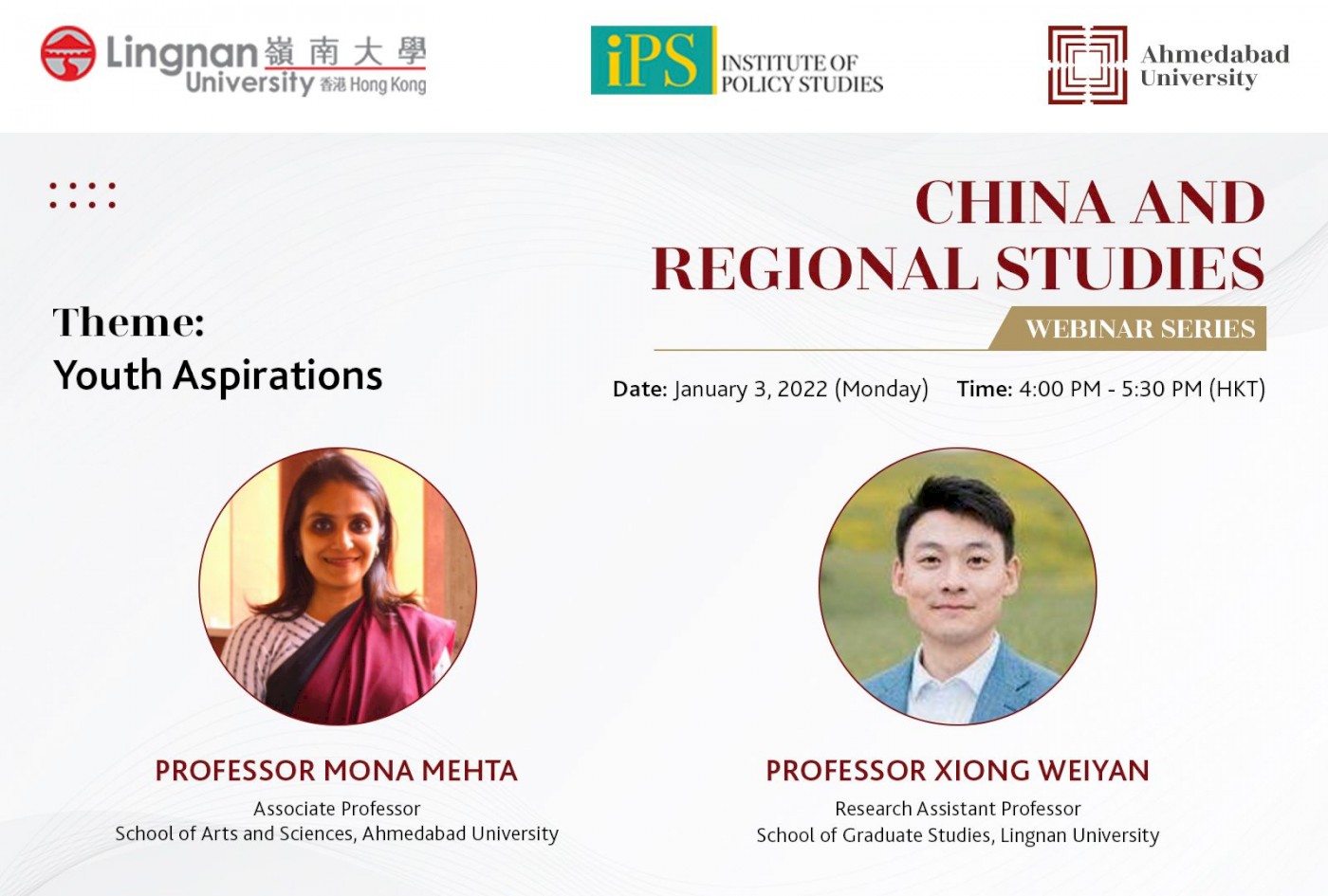China and Regional Studies Webinar Series: Youth Aspirations

Lingnan University and Ahmedabad University are jointly organising China and Regional Studies Webinar Series in 2022. The series taps into the topical nature of China and India relations and the experiences of the two countries in key areas that can be fruitfully compared. The webinar series is designed to disseminate and explore the intellectual potential of research fields for future collaboration. The topics include youth aspirations, urban development, cultural practice, and the political economy of gender.
Theme: Youth Aspirations
Date: January 3, 2022
Topic: Beyond ‘Time pass’ and ‘Dream Zones’: Youth aspirations and innovations in skill development in Gujarat, India
Speaker: Professor Mona Mehta, Associate Professor, School of Arts and Sciences, Ahmedabad University
This talk will examine how lower middle-class youth with limited education and cultural capital cope with conditions of economic precarity in the post-liberalisation Indian economy. What are the factors that influence aspirations for social mobility and skill development in the informal economy? What role do caste and community networks play in youth embrace of new skills and occupations? I examine these questions through a focus on the unique occupational trajectories of pastoralist or maldhari youth in the western Indian state of Gujarat. I draw on analysis of maldhari popular culture reflected in songs and music videos on social media, interviews of youth, elders and activists and participant observation in maldhari community gatherings.
Topic: Tackling the dispiriting mismatch between graduate numbers and employment opportunities
Speaker: Professor XIONG Weiyan, Research Assistant Professor, Lingnan University
Professor Xiong began his address on the struggles faced by many of the nation’s non-elite students, who discover that there is often little correlation between their efforts and their prospects in the jobs market, by defining what the trending terms “involution” and “lying flat” mean.
The term involution was originally used to describe the phenomenon whereby greater input does not produce a proportionally greater output, Prof Xiong explained. However, he noted, its use has evolved. “It’s now used to describe irrational and unnecessary competition within an industry, and a system, especially education.”
While Professor Xiong defined lying flat as the feeling of burn out that has led, in the education sector, some students to decide to opt out of the relentless competition to work longer and harder.
One of the main roots of this problem lies in the massification of China’s higher education that has taken place since 1999. In that period, enrolment figures have increased severalfold to over 50 per cent of the eligible demographic, and the number of graduates by nine-fold, to over nine million in 2021. Many more, seemingly well-qualified, young people are, therefore, competing for a limited number of, what are seen as, desired positions in the jobs market.
While the Chinese government is promoting entrepreneurship, and vocational and application-oriented education, Prof Xiong pointed out that this move does pose a challenge to Chinese culture and society, which treasures research-oriented degrees.
Professor Xiong did have suggestions for tackling this and other aspects of the underlying problem, though. He said the definition of what constitutes success needed to be expanded at both the institutional and the individual student levels. He also recommended that young people get out of their comfort zones and prepare specifically for the careers they really wanted to pursue – while acknowledging that, currently, many young people don’t seem to know what they want to do. Finally, he said young people should accept they will need to become life-long learners.
In conclusion, Professor Xiong expressed the hope his presentation could help generate ideas for future research collaborations between Lingnan and Ahmedabad.



